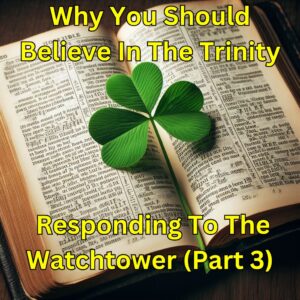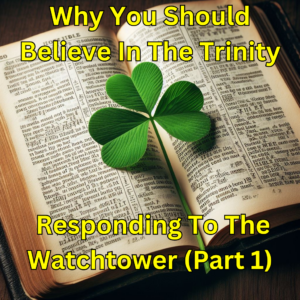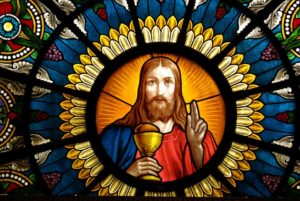Revised on April 23rd 2020
Heretics who deny the deity of Jesus have typically come up with several arguments and objections to try to show that Jesus is not God. They even try to use passages in The Bible to support their point. It’s crucial that we as Christians learn to defend against these objections since the deity of Jesus is one of the crucial doctrines of the Christian faith. Let’s look at 5 of the most common objections to the deity of Jesus.
1: Jesus never said “I Am God”.
One common objection I hear is that Jesus never once said the words “I am God.” There is not a single verse in any of the 4 gospels where Jesus utters the words “I am God”. You would think that since this is such a crucial doctrine of Christianity that Jesus would be a lot more explicit with his claims to deity wouldn’t he?
This objection to Jesus’ divinity is very weak, and there are several problems with this. For one thing, we need to remember that Jesus had a mission to fulfill. He had to fulfill all of the prophesies written about Him in the Old Testament (e.g Psalm 22, Micah 5:2, Isaiah 9:6, Isaiah 53, Zechariah 9:9 etc.) in order to provide evidence that He is indeed the promised Messiah. Jesus couldn’t simply come on the scene, tell people that He was the messiah and leave it at that because there were many false messiahs around at that time. People needed strong evidence in order to discern who was the real messiah and who was a phony. The real messiah would be known by fulfilling prophesies. Fulfilling all of the numerous prophesies about the messiah took time, and if Jesus came right out and said “Hi folks, I’m God!” that would be heard in Jewish ears as clear cut blasphemy. They would stone him to death right away. He would be executed far too soon, and wouldn’t have the opportunity to fulfill all of the prophesies written about Him.
Moreover, the Jews had no concept of a Trinity. While there are hints of God’s multi-personal nature in the Old Testament (e.g and Jews were aware of this prior to the time of Christ, see the book “The Two Powers In Heaven”), the clearest evidence of the doctrine of the Trinity wasn’t shown until The New Testament was written. As such, people had no concept of The Trinity. If Jesus said “I am God”, people would think He was saying “I am The Father”, which wouldn’t be correct. Jesus is God, but not God The Father. He’s the second person of the Trinity, not the first. Jesus didn’t want people to believe a heresy, so He chose His words carefully.
Although Jesus never said the exact words “I am God”, He nevertheless did claim to be God in such ways as to avoid being killed too soon and to avoid modalistic misconceptions. For example, as is explained in the short Reasonable Faith video “Who Did Jesus Think He Was?”, in the New Testament Jesus claims to be the “Son Of Man”.
But what did Jesus mean when he claimed to be the son of man? He’s referencing the end times figure in Daniel 7:13-14. Daniel 7:13-14 says “In my vision at night I looked, and there before me was one like a son of man coming with the clouds of heaven. He approached the Ancient Of Days and was lead into his presence. He was given authority, glory, and sovereign power; all peoples, nations, and men of every language worshipped him. His dominion is an everlasting dominion that will not pass away, and his kingdom is one that will never be destroyed.”
Daniel prophesies an individual called the “son of man” who comes “on the clouds of heaven”. He approaches “The Ancient Of Days” which was one of the names ancient Jews called God. Daniel says that this son of man figure is given authority, glory, and sovereign power by God, and that people all over the world will worship him.
Jesus is claiming to be this figure who enters God’s presence, has sovereign power over all creation, and receives worship from people all over the world! It seems to me that whenever Jesus claimed to be “The Son Of Man”, He was claiming indirectly to being God. We know that it’s very likely that Jesus made this claim of Himself given the principle of dissimilarity. The principle of dissimilarity is one of the historical “criteria of authenticity” that historians use when examining historical documents. The principle of dissimilarity says that if a saying or action is accredited to Jesus in the gospels that cannot be derived from the Christianity which proceeded him, then the saying or deed is more likely to be historical than not.
In the gospels, Jesus claimed to be The Son Of Man 88 times and yet, Jesus is hardly ever called the Son Of Man in the New Testament epistles and neither is He called the Son Of Man in any of the writings of the early church fathers. If The Son Of Man were a title retroactively inserted into the mouth of Jesus by the early Christian church, we would expect the early church fathers to call Jesus the son of man a lot more often. But in fact, 99% of the times Jesus is called the son of man is in the gospel accounts (hardly ever in the church fathers’ writings or even the NT epistles).
Therefore, it’s very likely that the historical Jesus did in fact call himself “The son of man”. This conclusion is derived at through pure historical methodology alone, not on the basis of presupposing biblical inspiration or inerrancy. We concluded that Jesus made these son of man statements based on the historian’s principle of dissimilarity, not by saying “The Bible says it. I believe it. That settles it.” To go into more detail, see the video “Who Did Jesus Think He Was?”.
Therefore, it’s very likely that the historical Jesus did in fact call himself “The son of man”. This conclusion is derived at through pure historical methodology alone, not on the basis of presupposing biblical inspiration or inerrancy. We concluded that Jesus made these son of man statements based on the historian’s principle of dissimilarity, not by saying “The Bible says it. I believe it. That settles it.” To go into more detail, see the video “Who Did Jesus Think He Was?”.
However, aside from the subtle claims to deity, Jesus actually DID make some explicit claims. For example, Jesus said in John 10:30 “I and the Father are one” and the Greek word there for “one” means “one in essence” or “one in nature”. Jesus said outright that He and His Father share the same essence. In John 8:56-59, Jesus said to some of the Jews “Your father Abraham rejoiced at the thought of seeing my day ; he saw it and was glad.” The Jews responded “You are not even yet fifty years old and you have seen Abraham!” and Jesus said “I tell you the truth, before Abraham was born, I Am.” The Jews then tried to stone him, but Jesus hid himself,
slipping away from the temple grounds.
slipping away from the temple grounds.
Why did the Jews try to stone Jesus when He said “Before Abraham was born, I Am”? Well, have you read the book of Exodus? If you haven’t, have you at least watched the movie “The Ten Commandments” starring Charleton Heston? In the book of Exodus and the Ten Commandments movie, God appears to Moses in the form of a burning bush. God tells Moses to go to Egypt to order Pharoah to set the Israelites free. Moses asks God “If I go to them and they ask me ‘who sent you’ what should I say to them” and The Lord responds “I Am who I Am. This is what you are to say to the Israelites: ‘I Am has sent me to you’.” (See Exodus 3)
Here’s the thing; Jesus is either using extremely bad grammar or he’s taking the name that God claimed for himself in Exodus 3 and is applying it to himself. Jesus is saying in a not so subtle fashion, that he is the One who appeared to Moses in Exodus 3 (i.e God). Now, it cannot be confirmed that Jesus made these last two statements in John’s gospel through applying any of the criteria of authenticity (e.g the principle of multiple attestation, the principle of embarrassment, enemy attestation, the principle of dissimilarity, etc.), but if we believe that John’s gospel is inspired by God, then we can appeal to these passages when witnessing to those who believe The New Testament is inspired but who deny the deity of Jesus (e.g Mormons, Jehova’s Witnesses). If you’re witnessing to people who don’t believe The New Testament is inspired (e.g atheists) then only use the passages you can apply the principles of authenticity to (e.g the son of man sayings listed above).
In conclusion, just because Jesus never said the 3 words “I am God” does not mean that He didn’t claim to be God.
2: Jesus Is Not Omniscient
Deniers of Jesus’ deity also point to passages like Mark 13:32 where Jesus says that He does not know the day or the hour of His coming. God is omniscient. If Jesus is not omniscient, then Jesus is not God. The problem with using Mark 13:32 as a proof text for Jesus’ non-divinity is that it ironically is good evidence for Jesus’ deity rather than against His deity. I point this out in “The Self Understanding Of Jesus” so I won’t rehash all of that here.
Instead, I will address the issue of why Jesus didn’t know when His second coming is supposed to be. There is a model of the incarnation which argues that the reason Jesus didn’t know the time of His second coming is because when Jesus became incarnate, all of his knowledge about everything in the universe was shoved into Jesus’ subconscious.
This would explain not only why Jesus didn’t know the time of his second coming, but also why we don’t have the picture of a baby Jesus speaking full blown Hebrew in the manger scene, yet still be the omniscient God. It would also explain how Jesus “grew in wisdom and stature” (Luke 2:52) while still being the omniscient God of the universe. His knowledge was limited in His conscious life, but His vast knowledge of everything from auto mechanics to quantum mechanics was tucked away into His subconscious. So, in this sense, Jesus could both know and not know something at the same time.
Recently, I heard a song that I learned at vacation Bible school when I was 4 years old. I hadn’t thought of that song in over a decade. Yet when it started playing, I immediately recognized it and was able to sing along. I knew the song. I knew the words. But the knowledge was tucked away in my subconscious and therefore, I wasn’t aware of the fact that I knew the song. I can imagine that much of the human Jesus’ divine knowledge was tucked away in a similar fashion. So even though He was omniscient, He still had to learn the Hebrew equivalent of His ABCs, 123s, how to read and write, and study the Old Testament scriptures. By the way, the song I remembered was “Deep and Wide”.
For those who are interested, I wrote a whole article on this called “A Biblical and Logically Coherent Model Of The Incarnation”. This model I defend
is a model of the incarnation that I learned from Dr. William Lane Craig.
is a model of the incarnation that I learned from Dr. William Lane Craig.
3: Jesus prays to God. If He were God, why would He pray to God? This makes no sense.
Actually, Jesus’ prayer life is good evidence for Trinitarianism. The doctrine of The Trinity states that there is only 1 God who exists as 3 persons in 1 divine essence. This doctrine is inferred from 5 different teachings found in scripture; (1) There is only 1 God, (2) The Father is God, (3) Jesus is God, (4) The Holy Spirit is God, (5) The Father, The Son, and Holy Spirit are distinct persons.
Modalists deny that 5th point and say that God is only 1 person who just changes between 3 different “modes”, and the Father, Son, & Holy Spirit are the different modes God goes through. One of the arguments I use against modalism is Jesus’ prayer life. Jesus treats The Father as if He were a separate individual. He talks to The Father in prayer, He gives thanks to The Father, and this would not make any sense if modalism were true. If Modalism were true, Jesus would be a strange individual who talks to himself as if he were another person.
I don’t think Jesus’ prayers to God are evidence against his divinity at all. I do think they’re evidence against modalism.
4: If Jesus is God, How Could He Have Died?
I hear this objection against Christ’s deity more from Muslims than I do other non-believers. “How could God die?” they ask. The problem with this complaint is that they have essentially misunderstood the dual nature of Christ. Jesus is God, but he’s also a human being. He is The Word who became flesh and made His dwelling among us (John 1:14). When Jesus died, his human nature died. But his
divine nature did not (Luke 23:46). This isn’t really that difficult to understand. The way Jesus died is the same way humans die. When humans die, their immaterial souls leave the physical body and go to either Heaven or Hell to await the bodily resurrection. When Jesus died on the cross, the divine Logos left the body of Jesus of Nazareth and went to Heaven. 3 days later, the divine Logos or Word came back into the body of Jesus. The divine Logos who existed prior to creation of the world (John 1:1) never stopped existing. It’s just that the Logos left the body of Jesus of Nazareth until the resurrection 3 days later.
divine nature did not (Luke 23:46). This isn’t really that difficult to understand. The way Jesus died is the same way humans die. When humans die, their immaterial souls leave the physical body and go to either Heaven or Hell to await the bodily resurrection. When Jesus died on the cross, the divine Logos left the body of Jesus of Nazareth and went to Heaven. 3 days later, the divine Logos or Word came back into the body of Jesus. The divine Logos who existed prior to creation of the world (John 1:1) never stopped existing. It’s just that the Logos left the body of Jesus of Nazareth until the resurrection 3 days later.
5: Jesus said “The Father is greater than I”.
Jesus said, “The Father is greater than I.” (John 14:28). This is just a distinction between God the Father and God the Son. As the human version of the invisible God (Colossians 1:15), Jesus was in a lower position than the Father. Jesus had taken on human nature. As mentioned above, His omniscience was tucked away into His subconscious, so that He didn’t know everything in the conscious life. Jesus got tired, He had to eat and drink to keep his body alive. He was reduced to a position that is “a little lower than the angels.” (Hebrews 2:9). But after the resurrection, all of these limitations were removed from Jesus. Taking John 14:28 in context, this makes sense why Jesus said “If you loved me, you would be glad that I am going to the Father, for the Father is greater than I.” Jesus says that his disciples should be glad that He’s going away. Why? Why should the disciples be glad that Jesus is going away? Jesus gives the answer in the very next sentence “…for the Father is greater than I.”
The reason they should be glad is because Jesus is going to ascend back to the throne He sat on with The Father, those human limitations he gained when He became incarnate are going to be removed. He will no longer be hungry, thirsty, tired. He will no longer have to learn anything, His omniscience will be 100% consciousness and 0% subconsciousness.
The Father at that time was greater than The Son because The Father wasn’t incarnate, so He didn’t have any of the human limitations His son Jesus had. The Father wasn’t ontologically greater than the Son, but functionally greater than the Son.
Think of it this way; if I said “The President Of The United States is greater than I….” would I mean that I am an inferior being to the president? Of course not. He’s a human being and I’m a human being. But the president is greater than I am in some ways. He’s got more military capacity than I do, he’s got more money than I do, he lives in a nicer house than I do, but he isn’t a superior being. We’re both human beings and therefore “created equal”. I think when Jesus said “the Father is greater than I” I believe he meant God was greater in a similar sense.
This interpretation is all the more plausible given the numerous scriptures in John’s gospel alone that confirm Christ’s deity (e.g John 1). We need to interpret scripture in light of scripture. In light of the overwhelming biblical evidence that Jesus is God, which interpretation of John 14:28 makes more sense? The one I gave in the paragraphs above, or the one the skeptic gives?




